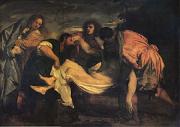Wholesale Oil Painting No Minimum |
|||||||||||
|
|
|||||||||||

|
|||||||||||
|
|
|
||||||||
TitianItalian High Renaissance Painter, ca.1485-1576 Italian painter active in Venice. As a young man he was taught by the Bellini family and worked closely with Giorgione. His early works are so similar in style to Giorgione's as to be indistinguishable, but soon after Giorgione's early death Titian established himself as the leading painter of the Republic of Venice. Among his most important religious paintings is the revolutionary and monumental Assumption (1516 ?C 18) for Santa Maria dei Frari, in which the Virgin ascends to heaven in a blaze of colour accompanied by a semicircle of angels. Titian was also interested in mythological themes, and his many depictions of Venus display his work's sheer beauty and inherent eroticism. Bacchus and Ariadne (1520 ?C 23), with its pagan abandon, is one of the greatest works of Renaissance art. Titian was sought after for his psychologically penetrating portraits, which include portrayals of leading Italian aristocrats, religious figures, and Emperor Charles V. He reached the height of his powers in The Rape of Europa (c. 1559 ?C 62), one of several paintings done for Philip II of Spain. He was recognized as supremely gifted in his lifetime, and his reputation has never declined. |
||||||||
|
|
||||||||
The Entombment (mk05)
The Entombment (mk05) Painting ID:: 20125 |
Canvas,58 1/4 x 83 1/2''(148 x 212 cm)Collections of the Gonzagas (Mantua)and of Charles I;acquired by Louis XIV from Eberhard Jabach in 1662 Canvas,58 1/4 x 83 1/2''(148 x 212 cm)Collections of the Gonzagas (Mantua)and of Charles I;acquired by Louis XIV from Eberhard Jabach in 1662 |
|||||||
|
|
||||||||
|
SCHEDONI, Bartolomeo Italian painter, Emilian school (b. 1578, Modena, d. 1615, Parma) Italian painter and draughtsman. He was the son of Giulio Schedoni, a mask-maker, who served the Este court in Modena and the Farnese in Parma; in 1598 Schedoni and his father are recorded as residing in Parma, both serving the court. In 1595 Ranuccio I, Duke of Parma, sent Bartolomeo to Rome, to train in the studio of Federico Zuccaro. Schedoni fell ill shortly after, however, and returned to Parma. His earliest surviving works show no evidence of Roman influence. The matter of Schedoni's training remains somewhat problematic. Carlo Cesare Malvasia claimed that he was a pupil of Annibale Carracci in Bologna, but there are reasons to doubt this. First, this would have been prior to Annibale's departure for Rome in 1595, a period when Schedoni was still apparently under his father's jurisdiction. Secondly, the early pictures indicate that initially his style was formed primarily by studying the work of Correggio in Parma. To a lesser degree he was influenced by the Parmesan culture of Parmigianino, Girolamo Mazzola Bedoli and Michelangelo Anselmi. As a boy in Parma he was also known to have frequented the studio of the Fleming Giovanni Sons (1547/8-1611). The Entombment (mk05) Canvas,97 1/2 x 71 1/4''(248 x 181 cm)Painted for a convent near Parma;obtained from the Accademia in Parma,1796 |
||||||||
|
|
||||||||
|
Prev Next
|
||||||||
|
|
||||||||
|
Related Paintings to SCHEDONI, Bartolomeo :. |
||||||||
|
|
||||||||
|
CONTACT US |

